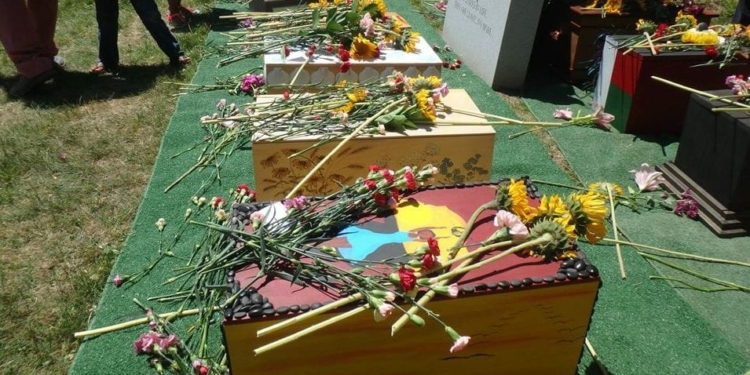COLONIE — The remains of slaves that were found over a decade ago on land that belonged to the colonial Schuyler family have been permanently buried.
In 2005 during a pipe replacement construction project, bones were uncovered on the Schuyler Flatts property. The area of land that the bones were found on was part of an unmarked burial ground. Upon investigation and DNA analyses conducted by Hartgen Archeological Associates and the bio-archaeologists from the New York State Museum, it was discovered that the bones were over 200 years old and were the remains of slaves who had been owned by the Schuyler family. The bones belonged to 14 human beings — six women, one man, two children, and five infants. Researchers found that two of the women had ancestry tracing back to Madagascar, and one of the other women was related to the Mi’kmaq Indians.
On Saturday, the bones were buried in the Founder’s Hill section of St. Agnes Cemetery. The graves can be identified by an engraved marker donated by the town of Colonie. The plots were provided by the Albany Diocesan Cemeteries. The bones were buried in containers that were designed by community artists.
Evelyn Kamili King, chair of the Schuyler Flatts Burial Ground Project, said that she became involved with the burial project because she felt it was “disrespectful” to keep the bones in the state museum. King said that the burial project was a mission bestowed upon her by her African ancestors. King, who is an Albany native, had been living in North Carolina but moved back home when she heard about the bone discovery and subsequent excavation.
“They were in the museum for 11 years and I just couldn’t deal with that situation because they were my African ancestors,” King told Spotlight News during a phone interview. “It was very painful to know that these were babies and children.”
According to King, African Americans are a generally spiritual people who place emphasis on honoring and respecting their ancestors.
“We still have scars from the African slave trade,” King said. King noted that the Schuyler Flatts project has helped to remind people that slavery was not just a Southern practice, which is something more people need to be made aware of. According to King, the burial project forced people to come face-to-face with the fact that the slave trade had tendrils that reached directly into the Capital Region, a fact that some people didn’t always want to believe.
Chairing the project has come with a personal sacrifice on Kings part. King, who taught history within the Albany Public School district, became the project manager in February 2015 and for a while, was solely responsible for getting the word out. That became easier when the project began to utilize social media Lack of funding for the project was also a huge hurdle to overcome. King said she hasn’t had a social life since she took over as chair, and that the road to the eventual burial seemed never-ending.
“It just took a whole lot of time out of my life. I’m feeling a lot of peace at this point. “It was a journey, it really was,” King said. Working on the project and being face to face with the enslavement of her ancestors each day made King depressed at points, she said, but feels that she accomplished another main goal of the project, which was to start a dialogue about racism and prejudice in the area.
King believes that more bones will be found throughout the region as people continue to build and develop, and hopes to help in creating an official African burial ground in the Capital Region. But as far as the present goes, King has completed her mission: honoring her ancestors, and making sure that they’re no longer forgotten.
“They’re free, they’re going to be free,” she said.



